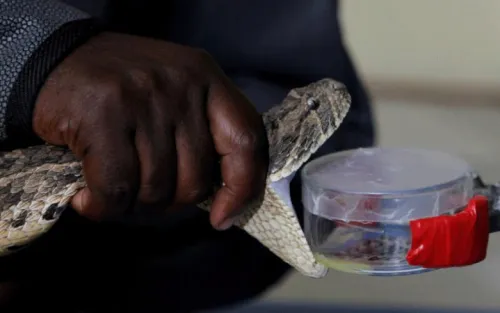The Institute for Primate Research (IPR) Kenya has announced that it is closer to producing an African country anti-venom.
Kenya has been importing anti-venom from Europe and India. However, these anti-venoms are expensive for the common mwananchi to afford.
For instance, IPR Kenya CEO Gichuhi Mwethera says that anti-venoms for snake bites can cost between KSh10,000-Ksh15,000 per vial. An ideal patient bitten by a venomous snake may require up to five vials.
Most importantly, it has emerged that most of these imported anti-venoms are ineffective for treating snake bites in Kenya.
“Most of the anti-venoms are imported from Europe and India but less than 50 per cent are effective for treatment of snake bites. As a research institute, we will soon be rolling out the first African developed anti-venom that will be more effective,” says Gichuhi.

He says that anti-venoms are mostly specific to a certain region. A drug can be effective in Europe, South Africa or India, but not in Africa.
“We shall in the next two years roll out anti-venom that is 80 per cent effective and we are working with the Poisons and Licensing Board to validate the effectiveness of the treatment.”
Gov’t committed
In 2023, Tourism Cabinet Secretary Dr. Alfred Mutua said that the government was committed to allocating funds towards enhancing applied research to speed up local production of anti-venom.
With the threat of climate change, lethal snakes have been driven out of their natural habitats into neighbourhoods, leading to rising cases of snake bites.
The Kenya Snakebite Research and Prevention Centre acknowledges that the country is home to some of the deadliest snakes in Africa.
The centre notes that the arid and semi-arid regions of the country are highly prone to snakebites. Counties of Baringo, Garrissa, Kitui, Kilifi, Marsabit, Machakos, Isiolo, and Taita Taveta recording high cases.

Startling snake bites data
The World Health Organisation (WHO) says that many snake bite victims do not attend health centres or hospitals and instead rely on traditional treatments.
Available data by WHO show 4.5–5.4 million people get bitten by snakes annually. Of this, 1.8–2.7 million develop clinical illness and 81 000 to 138 000 die from complications.
In Kenya, 800 people are killed annually from snake bites.










